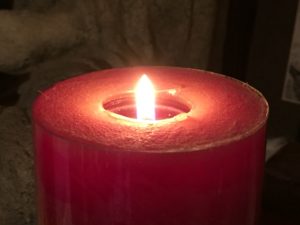 This morning I read a reflection by Henri J.M. Nouwen, the widely read priest and author noted for his work with the poor and disabled. Entitled The Spiritual Work of Gratitude, the reflection ended with this prayer: Lord, cultivate within me a spirit of gratitude for all you’ve given and all you’ve taken away. Blessed be your name, Lord. Amen.
This morning I read a reflection by Henri J.M. Nouwen, the widely read priest and author noted for his work with the poor and disabled. Entitled The Spiritual Work of Gratitude, the reflection ended with this prayer: Lord, cultivate within me a spirit of gratitude for all you’ve given and all you’ve taken away. Blessed be your name, Lord. Amen.
Now, it’s easy to generate gratitude for blessings given, for people and events and things in our lives that we see as positives, but the second part about having a spirit of gratitude for all God has taken away from us – that’s asking for something else entirely. That’s probably why the prayer is for the cultivation of that spirit, because it doesn’t grow within us naturally. Nor is it necessarily natural to consider that important parts of our lives that have slipped away from us might have been “taken away.”
What would it mean to live in gratitude for all that has been taken away from us?
We can be grateful that what was so precious to us was, at least for some period of time, ours. We can be grateful for what we learned from the experience of having that promise/person/position/thing that we loved, and put our focus there rather than on the pain of the loss. We can be grateful for the implied possibility, that if we had it once, we can surely have it again. But beyond that, what would it mean to be grateful for what has been taken away?
If our perception is that the loss was the work of the Lord, the choice of the Lord, and if we at the same time believe that the Lord is good, then we become candidates for grace. Because then we will be living in faith. And faith is always cause for, always leads to, gratitude.




 It’s December 2nd. Tonight at sundown the Jewish festival of Hanukkah begins.
It’s December 2nd. Tonight at sundown the Jewish festival of Hanukkah begins. My niece recently posted on Facebook something called “The Other Serenity Prayer.” Most of us know by heart the standard Serenity Prayer, which goes: “God, grant me the serenity to accept the things I cannot change, the courage to change the things I can, and the wisdom to know the difference.”
My niece recently posted on Facebook something called “The Other Serenity Prayer.” Most of us know by heart the standard Serenity Prayer, which goes: “God, grant me the serenity to accept the things I cannot change, the courage to change the things I can, and the wisdom to know the difference.” My friend Mary reminded me of that old song that includes the line that the bluest skies you’ll ever see are in Seattle. These October days show clearly why someone might have that thought. It is rare for Seattle to have such a string of beautiful, clear, vivid days like we have been having.
My friend Mary reminded me of that old song that includes the line that the bluest skies you’ll ever see are in Seattle. These October days show clearly why someone might have that thought. It is rare for Seattle to have such a string of beautiful, clear, vivid days like we have been having. I’ve been thinking about the connection between praising and giving. There must be a strong, direct connection because congregations all over the nation, if not the planet, routinely close the “giving” portion of the worship service with the Doxology: “Praise God from Whom All Blessings Flow.”
I’ve been thinking about the connection between praising and giving. There must be a strong, direct connection because congregations all over the nation, if not the planet, routinely close the “giving” portion of the worship service with the Doxology: “Praise God from Whom All Blessings Flow.” A blog entry here two and a half years ago (January 2016) discussed a phase I was in of reading Marilynn Robinson books. The phase is currently being revisited because my reading buddy, Linda, and I have taken up
A blog entry here two and a half years ago (January 2016) discussed a phase I was in of reading Marilynn Robinson books. The phase is currently being revisited because my reading buddy, Linda, and I have taken up  Several months ago, a friend and I read and discussed Jacqueline Winspear’s
Several months ago, a friend and I read and discussed Jacqueline Winspear’s  We’ve heard them preached on … some of us have even memorized the whole list of them … but often some confusion lingers about the “fruit of the Spirit” written about in the fifth chapter of Galatians. The first eight in the list are accepted readily: love, joy, peace, patience, kindness, goodness, faithfulness, and gentleness. We all see the value and blessing of these. But then there is that ninth one—that’s the one that gives us trouble: self-control.
We’ve heard them preached on … some of us have even memorized the whole list of them … but often some confusion lingers about the “fruit of the Spirit” written about in the fifth chapter of Galatians. The first eight in the list are accepted readily: love, joy, peace, patience, kindness, goodness, faithfulness, and gentleness. We all see the value and blessing of these. But then there is that ninth one—that’s the one that gives us trouble: self-control. I heard recently that there are 7,000 promises in the Bible, and admit that I have no idea how that number was determined. Maybe it’s just a nice, round number with a 7 in it. But whether they total 7,000 or not, there are too-many-to-count extraordinary promises in the Bible. Every few weeks, this blog looks at some of them.
I heard recently that there are 7,000 promises in the Bible, and admit that I have no idea how that number was determined. Maybe it’s just a nice, round number with a 7 in it. But whether they total 7,000 or not, there are too-many-to-count extraordinary promises in the Bible. Every few weeks, this blog looks at some of them. We’re now a couple of weeks into Lent, which started with Ash Wednesday, February 14. Did you “give something up”? If you made that commitment, how is it going for you? Maybe you are fasting from a particular food or a certain behavior. Maybe you are keeping a commitment to focus on your spirituality every day. Or maybe you’re beginning to think of other ways you might honor this season.
We’re now a couple of weeks into Lent, which started with Ash Wednesday, February 14. Did you “give something up”? If you made that commitment, how is it going for you? Maybe you are fasting from a particular food or a certain behavior. Maybe you are keeping a commitment to focus on your spirituality every day. Or maybe you’re beginning to think of other ways you might honor this season.